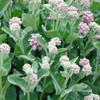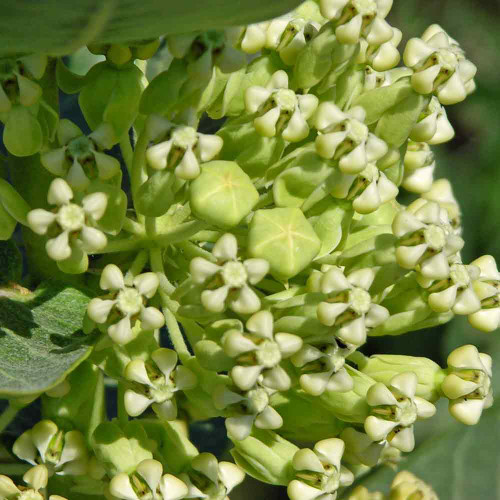Description
Showy Milkweed - (Asclepias speciosa)
This widespread milkweed is a stout single to multi-stemmed plant with large opposite leaves that terminate in several umbels near the top of the stem with large pink to purplish flowers. The stout stems have opposite spade-shaped leaves that are fuzzy on both sides with rather woolly hairs below.
This showy, pink-flowered milkweed is distinctive as having the largest flowers of any species of Asclepias in North America.
Flowers
May through September
Will These Grow in My Area?
The range of these milkweed species is not limited to Arizona but in most cases the entire southwest and beyond. Refer to the USDA map link and please realize that a milkweed species can grow and thrive outside of the areas listed if the conditions are favorable.
From that link, you’ll see the states shown where the milkweed is native. If you find a state that has areas with climate and conditions similar to yours, then that milkweed will most likely do very well for you.
Pods
Milkweed pods contain a seed floss that is used to stuff pillows or mixed with other fibers to make a cloth. It is used in Life Jackets or as a stuffing material. It is very water repellent. The floss is the mechanism for seed dispersal.
Why This Milkweed is Special
This milkweed seed is the highest quality available anywhere. It is hand-grown across central and northern Arizona, hand-harvested, hand-cleaned, and hand-packed. Over the past five years it has been test-grown in different elevations to verify the vigor and adaptability to different conditions.
Terroir Seeds is proud to be the exclusive partner in offering these unique milkweed seeds to home gardeners. The sale of each packet of milkweed seeds directly supports the continued, on-going research of Arizona Milkweeds for Monarchs organization, a dedicated volunteer citizen science research organization that is overseen by professional scientists from Northern Arizona University.
The milkweed plant (Asclepias spp.) plays a critical role in the monarch life cycle. Each spring Monarchs move across the United States, laying eggs on native milkweed, the only plant that serve as food for newly hatched monarch caterpillars. Arizona has more than 40 species of milkweed - more than 50% of the total diversity of milkweeds in the continental US - giving it the second greatest diversity of milkweeds next to Texas.
Other Names
- Broadleaf Milkweed
- Creek Milkweed
Growing Tip
In the fall when the milkweed pods split open and the seeds are flying out on the breeze, they have a natural germination-inhibiting coating on them so that they don’t sprout too early and die off during the winter.
Moisture and abrasion act on the seed coating to soak and wear it off in nature, allowing moisture into the seed in early spring to start the germination process.
Cold-wet stratification is easy to do at home and significantly increases the germination rate before planting them.
Here’s how to do it – label a sandwich-sized ziplock bag with the name of the milkweed and date, then fill it about 3/4 full with sand, decomposed granite, or another abrasive media. Add enough water to make the sand very wet – you should see the sheen of water when you squish the bag. Add the seeds – however many you want to plant – to the mixture and place the baggie on the top shelf of your fridge, where you can move it a couple of times daily.
This cool, wet, abrasive action mimics a winter in nature while starting the germination process.
Once a month has passed, plant your seeds as usual.
Learn More
- Milkweed Seed Germination Procedures
- Growing Milkweed for the Monarch Butterfly
- Planting A Pollinator Feast
From the soil to the seed to the food you eat - we'll help you grow your best garden!
2 Reviews
-
Good germination in only 3 days
I did the water method to germinate these, the whole packet of 20 or so seeds, no cold stratifying. On the third day, 16/20 had germinated. 16 is way more than I needed, so I stopped there. I'm going to give away the extras to neighbors!
-
Love these seeds!
So glad you have lots of milkweed varieties for the Monarchs! Thanks!















